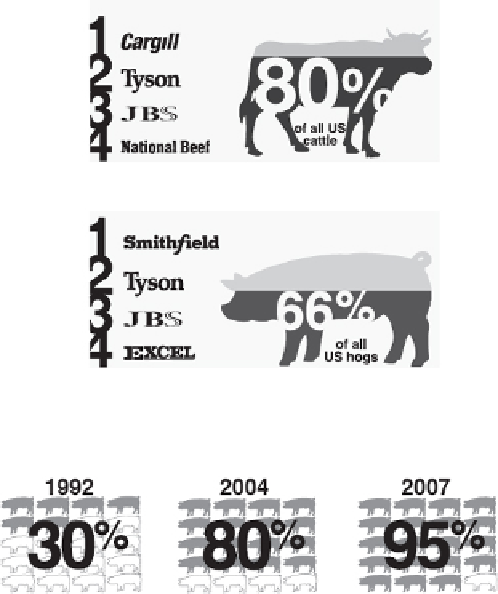Agriculture Reference
In-Depth Information
change in percentage of hogs that are raised on
factory farms
(more than 2,000 animals)
This debt makes the hog factory operator extremely dependent on the cash from the operation to pay
back the loans they have taken out for building and upgrading facilities. Operators that rely on a steady
contract relationship with a packer or processor are unable to complain about shoddy treatment or unfair
terms for fear of retaliation that could end their business.
8
The terms for hog production contracts can significantly disadvantage producers. Some provide a strict
management manual for growers, eliminating the producer's autonomy to make decisions.
9
Operators are
also responsible for securing permits for manure disposal and for taking on the environmental liability as-
sociated with it.
10
Some contracts even have a provision that allows the pork packer to evict farmers from
their own hog barns and force them to hire company-selected managers to finish if the packer decides that
the farmer was not properly caring for the livestock.
11
In many cases the companies use the contracting
process to force factory operators to increase the scale of their operations or lose the sales.
Unfortunately, a window of opportunity for tackling contract abuses was lost in the fall of 2011, as de-
scribed in the previous chapter, when the Obama administration capitulated to the meat industry and failed
to reform the rules.
12
Reforming these GIPSA regulations has been at the top of the agenda for many hog producers for many
years. Chris Peterson, a farmer from Clear Lake, Iowa, and president of the Iowa Farmers Union, views
the packer ownership and control of hogs through contracts as the major impediment to the return of a
level playing field for farmers. At the 2010 USDA/DOJ joint hearings held in connection with revising
the GIPSA rules, Peterson testified in support of them. He said that when he started raising hogs in the

Search WWH ::

Custom Search